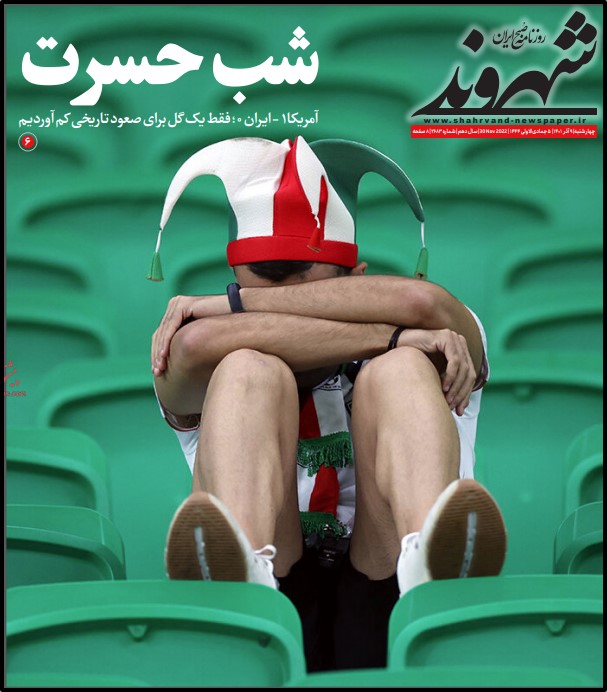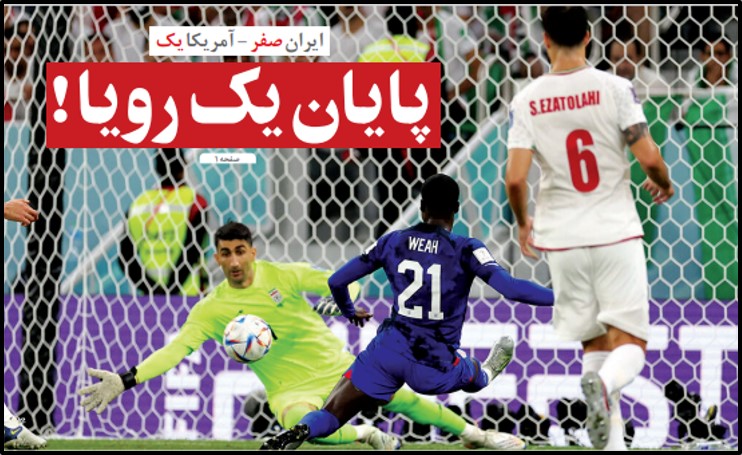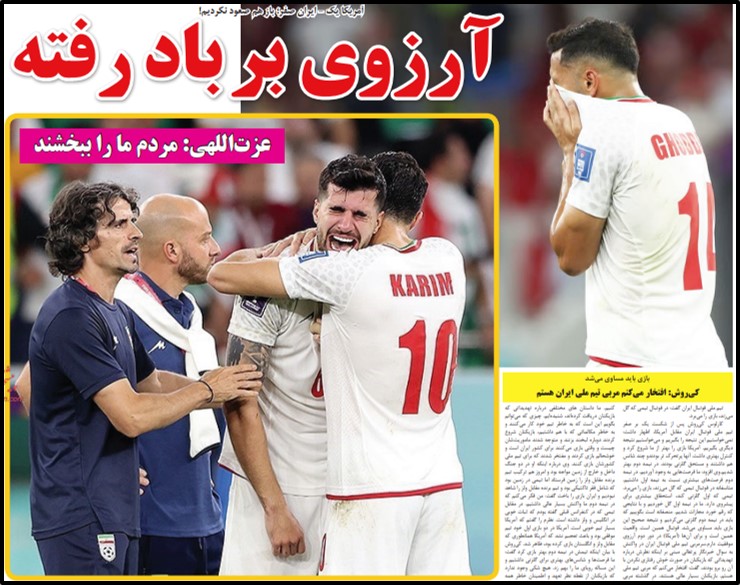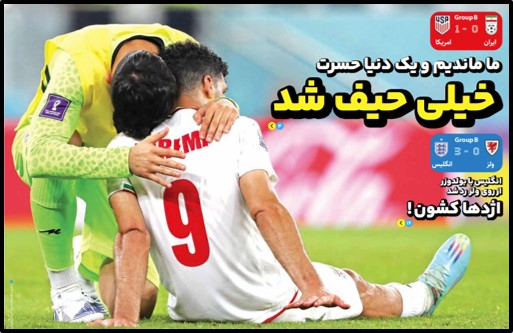Iran’s loss to the United States at the World Cup was splashed across the front pages of national media—both reformist and conservative—along with player apologies for failing the country and official condemnation of Iranians who rejoiced after the match. Poignant pictures captured the despair and the passions attached to the soccer match on November 29. The conservative Abrar Sports lamented, “The Wish was Lost,” while Shahrvand, a reformist newspaper, called the game a “night of regret.”

Officials were largely mute on the loss to a country dubbed “the Great Satan,” although Speaker of Parliament Mohammad Qalibaf commended the team’s effort and expressed hope for its future. On Instagram, Ramin Rezaeian, the team’s right back, grieved, “God, it seems like happiness actually doesn’t suit us!”
The public reaction was mixed. Some Iranians—in Tehran, the holy city of Mashhad and northern Kurdish areas—danced and honked their car horns in the streets to celebrate the loss. Amid protests across the country, they vilified the team as an extension of an oppressive regime, even though a few players had expressed solidarity with the demonstrations launched by the death of Mahsa Amini on September 16.
In an incident that went viral on social media, Mehran Samak—a lifelong friend of Saeid Ezatolahi, the soccer team’s midfielder—was shot and killed for honking his car horn. The players had struggled under conflicting pressure from protesters to support the movement and threats from the government to remain silent.
Not all Iranians reveled at the loss. In Tehran, Parham Azmand praised the team. “We couldn’t score, although we did whatever we could,” he told the Associated Press. “This was their day (the Americans). Our players did their best, and I hope we will perform better in future world cups and God willing go through to the second round.” The team, which beat the United States in their only other match, in 1998, has never made it into the World Cup’s second round.
Team Reaction
Players were anguished after the tournament. “I’m really sorry on behalf of our players, our group, that we couldn’t get our opportunity to qualify for the next round,” Ezatolahi apologized at a press conference. “I hope our fans and our people in Iran, they forgive us. And I feel just sorry, that’s it,” Ezatolahi added. “Life and football is going on, and that can be a good lesson for us, at least for the young players like me for the future.”

Head Coach Carlos Queiroz lauded his players. “I'm very glad they were able to give a response on the field and give prestige to the shirt…Throughout my career, I've never seen players that gave so much and received so little in return.” He also dismissed reports that the team was ordered to avoid talking about the protests under threat of government retaliation against their families. “The world, in the current circumstances, is full of stupidities,” he said after the match. “It's disinformation. It's a shame.”
Media Reaction
Many media did not criticize Iran for its scoreless loss to the United States. Several media outlets instead emphasized the national unity behind the team, despite the players’ silence during the national anthem before the November 21 England match. (Iran lost 6-2.) The team “won the real game: the game of uniting people’s hearts,” wrote Javan, a hardline daily linked to the Islamic Revolutionary Guard Corps (IRGC).

Government Reaction
Senior officials from the executive, judicial and legislative branches said little about player support for the protests. Qalibaf praised the team on Twitter. “The bright and talented youth of our country's national football team, despite the acceptable games and fielding in the World Cup competitions, failed to advance to the next stage, which does not harm their competence and abilities,” he wrote on November 29. “I hope that you will be successful and proud with more effort in other upcoming competitions,” he also tweeted.

Both hardliners and reformists denounced Iranians who wanted the national team to lose. “Today, [the enemies] are all trying to sow the seeds of despair in the hearts of young people, and some of them even showed their satisfaction afterward and that they are happy with the elimination of the national football team,” said Major General Hossein Salami, head of the Islamic Revolutionary Guard Corps. Former Culture Minister Abbas Salehi, who served under reformist President Hassan Rouhani, complained that “Iran’s defeat in the game against America was bitter, but even more bitter was the happiness of some people” over the loss.
Intersection with Protests
In a Kurdish epicenter of the protests, fireworks went off amid public celebrations of the defeat. People chanted “Woman, life, freedom,” the mantra of the uprising. In Saqez, the hometown of Mahsa Amini, women removed their headscarves in defiance of government regulations.
Unveiled dancing (two illegal activities) tonight in the city of Mahabad—Iranian Kurdistan—after Iran’s World Cup loss to USA.
— Karim Sadjadpour (@ksadjadpour) November 30, 2022
Are there other examples of populations celebrating a national sports defeat, especially to its government’s arch-nemesis? pic.twitter.com/Uzbax7wKMz
Security forces moved in to break up the celebrations in several cities. They reportedly shot at crowds in southwestern Behbahan and beat a woman in northern Qazvin. In Bandar Anzali, a coastal city on the Caspian Sea, security forces shot 27-year-old Mehran Samak in the head for honking along with protesters. On Instagram, Ezatolahi lamented the death of Samak, a former childhood friend and teammate. “I wish we could always remain that age, without concern, without hate, without jealousy, without fighting to destroy each other,” he wrote on November 30. “After last night’s bitter game, my heart burned even more at the news of your death,” he added.
Ezatolahi did not directly condemn the government, but he implicitly deplored the state of the nation. “Be sure that some day when the masks fall and the truth appears, they'll pay for your family's mournful hearts and your mother's grief,” he wrote. “This is not what my Iran deserves.”
In Tehran, dozens gathered at Samak’s funeral on November 30. Some mourners blamed the regime for Samak’s murder. They yelled, “Death to the dictator!” to denounce Supreme Leader Ayatollah Ali Khamenei.
Connor Bradbury, a senior program assistant at the U.S. Institute of Peace, assembled this report.
